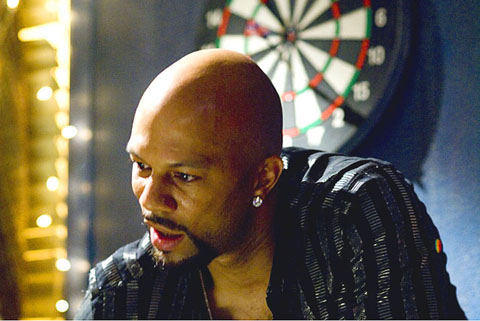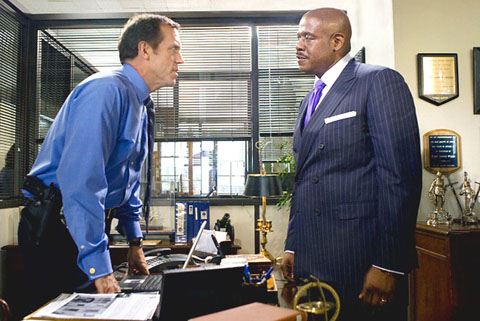The alarm clock buzzes. Keanu Reeves wakes up fully dressed in a striped shirt, raises his gun and rolls out of bed. He puts his piece on the bathroom sink, next to his toothbrush, and takes a good long look at himself in the mirror. Then he pukes in the toilet. He climbs into the car and heads down the freeway as a glowing orange orb shimmers behind the skyscrapers of Los Angeles. Only the sun isn’t rising. It’s setting.
Night: Koreatown. Tom Ludlow (Reeves) stops by a liquor store and gulps down a couple of teeny airline bottles of vodka. He insults some Korean hoods, who want to buy a machine gun he’s got stashed in his trunk, insinuating that they’re Japanese. “You dress white, talk black and drive Jew,” he tells them before throwing in an all-purpose anti-Asian slur.
Ludlow is a racist cop, a renegade cop, a vigilante cop. We know this because next he wantonly massacres a bunch of Korean bad guys and makes it look like they shot one another. Then, when he’s confronted by his African-American ex-partner, Terrence Washington (Terry Crews), he yells, “I’m racist!” In response, Washington calls him a “white boy.” This seems especially odd because the Chinese-Hawaiian-Caucasian Reeves is, ancestrally speaking, roughly as white as Barack Obama.

This is the setup for Street Kings, which immediately forgets it ever brought up all that racial stuff anyway. Almost as quickly, it loses interest in its main character’s alcoholism. Then it raises the idea that Ludlow may still be in pain over his wife’s death, but instantly ignores that, too, turning its deficit of attention to the killing of a police officer. The murder investigation leads the bull-headed Ludlow — who, mind you, does not play by the rules! — along a twisted trail of corruption that leads all the way to the highest levels of the LAPD. Yeah, I know. Who could have anticipated that?
If you wanted to make a strictly generic parody of crime writer James Ellroy’s hard-boiled Southland fiction (L.A. Confidential, The Black Dahlia, White Jazz), could you do worse than to hire Ellroy himself and then, maybe, re-write him a few times? Maybe not, because that’s what appears to have happened here. Ellroy is credited with the template-stamped story and is listed first in the screenplay credits, followed by Kurt Wimmer and Jamie Moss, each of their names separated by an “and” instead of an ampersand, which tells you that they did not work together. Director David Ayer (writer of Training Day and cowriter of The Fast and the Furious) has also been fingered as a scripting suspect, but he is not identified by name in the final line-up. If you’ve seen the trailer, know that about half of what’s in it isn’t in the final movie. That’s a hint.
Street Kings is an anemic attempt to evoke the big, shiny action pictures of the late 1980s and early 1990s, the heyday of Bruce Willis and Arnold Schwarzenegger, when Timothy Dalton was 007 and Clint Eastwood had fewer wrinkles and bigger hair. Back when, if an aquarium appeared in a scene, somebody was damn sure going to shoot it before the movie was over. The films, good and bad, were loud and slick and mostly set in LA, directed by people like John McTiernan, Richard Donner, Tony Scott and Renny Harlin: the Die Hards, the Lethal Weapons, The Rookie, The Last Boy Scout, The Last Action Hero.

PHOTOS COURTESY OF FOX
Reeves got in on that wave, too, with Point Break and Speed, dodging bullets and breaking regulations in the name of the law. Those were the days when overkill was never enough, and Street Kings at least gets that part right. The crooked cops are not only crooked, they’re also murderers willing to drop everything to rape their victims’ widows and girlfriends just for fun. They are bad, bad, bad.
So is the screenplay, which reads like a Bartlett’s of general-purpose action-movie lines:
“You were toe-to-toe with evil and you won.”
“Why can’t you have a normal life like everybody else?”
“Everything I touch dies.”
“Who are you to judge me?”
That doesn’t even scratch the surface of the movie’s banality, but every once in a while there’s a real doozy like: “He’s got a PhD in catching cops slipping up!” Or a text message from one crooked cop to another: “He’s here. Kill him.” And then the dude signs his nickname.
But come on, don’t give Keanu Reeves — or anybody, for that matter — a line like this, about Tom’s ex-partner: “We were black and white in black and white, back when it meant something.” Are these people trying to make the Showgirls of retro-1990s cop movies?
Sophomore director Ayer (Harsh Times) is maybe not so sure. He seems invested in the chases and shoot-outs, but sometimes his spatial relationships break down, and you can’t tell who is where. In one gunfight an entire Harvest Gold-colored refrigerator materializes out of nowhere. Meanwhile, Academy-Award winner Forest Whitaker doesn’t seem to know what movie this should be, while House star Hugh Laurie — giving exactly the same performance he does on TV — may be in on the joke, even if nobody else is.

There is a Chinese Communist Party (CCP) plot to put millions at the mercy of the CCP using just released AI technology. This isn’t being overly dramatic. The speed at which AI is improving is exponential as AI improves itself, and we are unprepared for this because we have never experienced anything like this before. For example, a few months ago music videos made on home computers began appearing with AI-generated people and scenes in them that were pretty impressive, but the people would sprout extra arms and fingers, food would inexplicably fly off plates into mouths and text on

From censoring “poisonous books” to banning “poisonous languages,” the Chinese Nationalist Party (KMT) tried hard to stamp out anything that might conflict with its agenda during its almost 40 years of martial law. To mark 228 Peace Memorial Day, which commemorates the anti-government uprising in 1947, which was violently suppressed, I visited two exhibitions detailing censorship in Taiwan: “Silenced Pages” (禁書時代) at the National 228 Memorial Museum and “Mandarin Monopoly?!” (請說國語) at the National Human Rights Museum. In both cases, the authorities framed their targets as “evils that would threaten social mores, national stability and their anti-communist cause, justifying their actions

On the final approach to Lanshan Workstation (嵐山工作站), logging trains crossed one last gully over a dramatic double bridge, taking the left line to enter the locomotive shed or the right line to continue straight through, heading deeper into the Central Mountains. Today, hikers have to scramble down a steep slope into this gully and pass underneath the rails, still hanging eerily in the air even after the bridge’s supports collapsed long ago. It is the final — but not the most dangerous — challenge of a tough two-day hike in. Back when logging was still underway, it was a quick,

US President Donald Trump’s threat of tariffs on semiconductor chips has complicated Taiwan’s bid to remain a global powerhouse in the critical sector and stay onside with key backer Washington, analysts said. Since taking office last month, Trump has warned of sweeping tariffs against some of his country’s biggest trade partners to push companies to shift manufacturing to the US and reduce its huge trade deficit. The latest levies announced last week include a 25 percent, or higher, tax on imported chips, which are used in everything from smartphones to missiles. Taiwan produces more than half of the world’s chips and nearly all